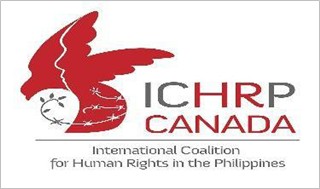Canadian
Parliamentary hearing on the human rights situation in the
Philippines
By
ICHRP-Canada
May 4, 2021
MANILA – The
Canadian House of Commons Subcommittee on International Human Rights
conducted a hearing on the human rights crisis in the Philippines on
Tuesday, May 4, 7:30 - 8:30 P.M. EST. The hearing was conducted
amidst growing calls to the Canadian government to end its policy of
quiet diplomacy in the Philippines and fulfill its commitment to
human rights.
 Following the Bloody
Sunday massacre in the Southern Tagalog region on March 7, 2021,
where 9 activists, human rights defenders, and community organizers
were killed in a coordinated police operation, 65 Canadian
organizations, including churches, trade unions, and Filipino
associations, and prominent individuals signed a joint letter to
Prime Minister Justin Trudeau expressing profound concern about the
deteriorating human rights situation in the Philippines and Canada’s
deafening silence.
Following the Bloody
Sunday massacre in the Southern Tagalog region on March 7, 2021,
where 9 activists, human rights defenders, and community organizers
were killed in a coordinated police operation, 65 Canadian
organizations, including churches, trade unions, and Filipino
associations, and prominent individuals signed a joint letter to
Prime Minister Justin Trudeau expressing profound concern about the
deteriorating human rights situation in the Philippines and Canada’s
deafening silence.
The Subcommittee invited
journalist Maria Ressa, one of Time Magazine 2018 Persons of the
Year, and Cristina Palabay, Secretary General of Karapatan
Philippines, a national network of human rights organizations, to
testify at the hearing. Quebec lawyer and co-chair of International
Coalition on Human Rights in the Philippines - Quebec, Guy-Lin
Beaudoin and Catherine Coumans of MiningWatch Canada, also
testified.
In her testimony, Ms.
Palabay underscored the urgency of the human rights crisis in the
Philippines. “It has become even more dangerous every day for human
rights defenders and ordinary citizens, with an epidemic of rights
violations in the Philippines.” Fifteen human rights workers of
Karapatan were among the 394 civilians killed “in the course of the
Duterte government’s counterinsurgency campaign.”
Even in the run-up to the
Canadian Parliamentary hearing, there had been no letup in the
military and police deadly campaign of terror.
On April 25, 2021, a local
government official, Froilan Saez Oaferina III, in Camarines Sur,
was killed after about 30 members of the Philippine National Police
went to his home to allegedly serve a search warrant.
On April 27, police
officers appeared at the office of the United Church of Christ in
the Philippines Southern Mindanao District in search of Bishop
Hamuel Tequis and five others, including two social workers and an
indigenous leader. They were charged with violating the Special
Protection of Children Against Abuse, Exploitation, and
Discrimination Act for sheltering indigenous evacuees at the
church’s Haran Centre.
Earlier, the government
froze the bank account of Haran Centre for alleged violation of the
Terrorism Financing Prevention and Suppression Act on allegations
that assets are being “used to finance terrorism.”
The application of this
law to harass human rights and other civil society organizations
into silence raises grave concern about Canada’s funding of a
program to combat “the financing of terrorism” for the Philippines
and three other Asian countries through the Association of Southeast
Asian Nations.
On May 2, Pastor Dan
Balucio of the United Church of Christ in the Philippines and youth
leader Sasah Sta. Rosa were arrested in the province of Bicol.
On the same day, John
Heredia, a well-known journalist, town administrator in the province
of Capiz and past chair of the provincial chapter of the National
Union of Journalists in the Philippines, was assassinated. In 2019,
his wife, Criselda, a human rights lawyer, and their daughter
survived an ambush.
These cases underscore the
impunity with which the Philippine military and police carry out
extrajudicial killings, arbitrary arrests, and other atrocities
against innocent citizens.
Ms. Palabay told the
Subcommittee, "in the midst of all these; there is the inadequacy or
lack thereof domestic mechanisms that encourage victims for the
rendering of justice and accountability. Courts mandated to provide
legal protection for defenders refuse or deny them, resulting in
more harmful impacts on our lives, security, and liberty.” She urged
the "Canadian government to actively take action on these concerns
with urgency, as our country further descends into an authoritarian
state.”
"Canada must end its
policy of quiet diplomacy," said Guy-Lin Beaudoin. Mr. Beaudoin
called on the Minister of Foreign Affairs to publicly condemn the
atrocities committed by the Philippine government and its security
forces. On behalf of ICHRP, he called on Canada to suspend all
Canadian support to the Philippine government's anti-terrorism and
counterinsurgency programs.
As well as, calling on the
Minister to urge the Canadian Embassy in Manila to apply vigorously
the tools in Canada's guidelines on supporting human rights
defenders (Voices at Risk) to protect those who face immediate
danger of being killed or arrested. Listing human rights violations
associated with Canadian mining companies operating in the
Philippines, Catherine Coumans called on Canada “to fulfill its
obligation to protect human rights in the context of the
deteriorated human rights situation in the Philippines, and in
particular to protect those who are criminalized and whose lives are
threatened for speaking out in defense of human rights and the
environment."
The International
Coalition for Human Rights in the Philippines is a global network of
organizations, concerned about the human rights situation in the
Philippines and committed to campaign for just and lasting peace in
the country. It aims to inform the international community about the
grave human rights situation in the Philippines today.